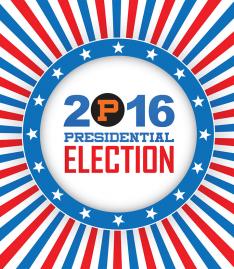This year, perhaps not so much.
“A lot of students feel dissatisfied with the two major candidates,” Gallo said, “so even though there are some passionate Hillary supporters, no one seems particularly excited about her candidacy, and most conservative students are obviously not excited about Trump.”
That view was not universal, however. Whig-Clio President Allison Berger ’18 said in mid-October that she expected Princeton students would vote “at least in line with and hopefully above national levels for our age demographic,” based on turnout at election-related events.
“Given that the two major parties’ candidates are the two least-popular presidential candidates in modern history, there was potential for students to feel disenchanted with the process and not engage with the election,” Berger said. “It has been really encouraging and rewarding to see that not be the case.”
The president of Princeton College Democrats, Amanda Glatt ’19, said she was pleased with the level of student involvement in the campaign. Members of the group took part in phone banks and other field work, including a trip to Trenton to register Latino voters, she said.
The College Democrats planned to send 12 students to campaign and canvass in what was regarded as a swing election district in Orlando, Fla., with funding from the Princeton Progressives, an alumni group.
The Princeton College Republicans decided to stay neutral on the question of a Trump endorsement. At several other schools, Gallo said, groups that either endorsed or outright rejected Trump experienced a split in membership. “We are a relatively small group, so we wanted to keep the group together and let each person vote for whomever their conscience leads them to,” she said.
Theodore Furchtgott ’18, a member of the College Republicans, said “the political climate among the Princeton undergraduate student body is overwhelmingly pro-Hillary, even among Republicans.” Furchtgott said most Republicans on campus did not support Trump because of ideological differences and doubts about his competence.
Several campus organizations joined together for a voter-registration effort Sept. 30, and booths were set up at several locations. The effort yielded 102 New Jersey voter registrations and 108 absentee-ballot requests, according to Michael Cox Jr. ’17, the USG’s campus and community-affairs chair. The Asian American Students Association and the Muslim Life Program sponsored voter-registration events as well.

